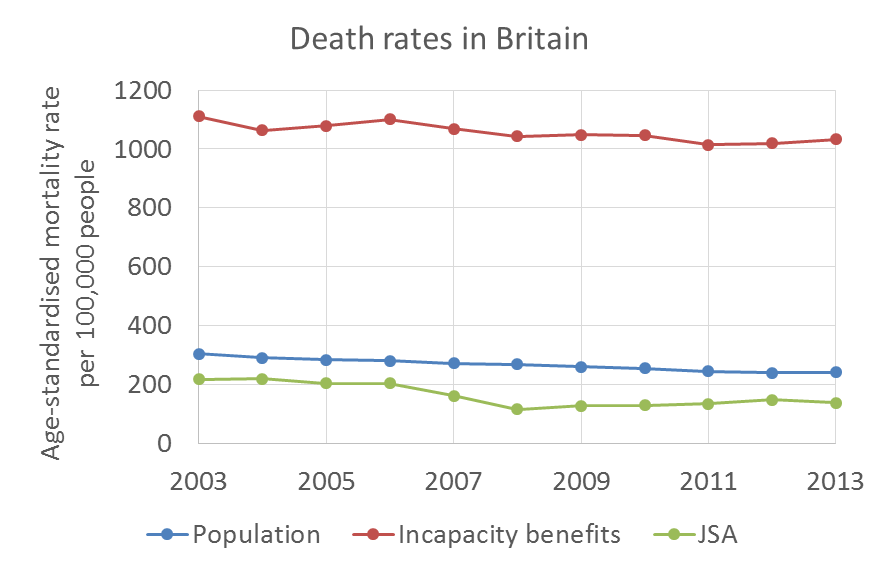Last week saw the Work Capability Assessment (WCA) in the headlines, not once, but twice – a rare occurrence even for a policy that featured in nearly ever party manifesto earlier this year. I’ll blog tomorrow about a widely-reported speech hinting at the future of the WCA by the Secretary of State. First, though, I want to focus on a front page of the Guardian prompted by DWP data released by a Freedom of Information Request, about the existing failings of the WCA.
Deaths and the WCA
Let’s start with the Guardian’s front page, labelled ‘Thousands have died after being found fit for work, DWP figures show’. As the article said, “Statistics released by the Department for Work and Pensions (DWP) revealed that during the period December 2011 and February 2014 2,380 people died after their claim for employment and support allowance (ESA) ended because a work capability assessment (WCA) found they were found fit for work.”
That sounds bad. It sounds like either these people were wrongly found fit-for-work (they died!), or even worse, that their deaths were somehow linked to the WCA process. And it’s clear the Government didn’t want to release these figures (which you can find here and here). They were released because of a Freedom of Information request (from Mike Sivier), after calls for the figures to be released for the last few years, and it took an Information Commissioner ruling to force the Government to release them.
However, I would go as far as saying that these figures show absolutely nothing of any interest. Firstly, that’s because we don’t know if more people die after being found fit for work than we would expect, given that some people who haven’t applied to the WCA would also die (this is Ben Goldacre’s criticism of the data). But more importantly, even if the death rate of the fit-for-work group is higher, this simply shows that this group have more health problems than people on average – which is precisely what we’d expect. It doesn’t show that the WCA decisions were wrong, nor that the WCA process caused the deaths.
[The data do indeed show mortality rates that are entirely consistent with the way that people are sorted into different benefit groups. On average, 240 out of every 100,000 people in the general population die every year (if we standardise the groups to have the same ages). There is a higher mortality rate in the Work-Related Activity Group (the people whose benefits are being cut from 2017) of 530, and an even higher rate of 1600 per 100,000 in the Support Group. Incidentally, it’s a mere 140 for those claiming JSA. The DWP also show that not much has happened to these over time (original chart here):

Being fair to inconclusive data?
The Guardian does accept that this isn’t a smoking gun in an accompanying editorial, which said the data does not “join any dots between the anxiety of undergoing a “work capability assessment” (WCA) and the spiral of mental and physical decline which comes across in cases.” But when the original article also notes “Ministers insisted that the data could not be used to link claimant deaths to its welfare reforms”, it insinuates the opposite – after all, is there anything more damning than a politician’s denial?
The Guardian team have done extremely good reporting on issues neglected by other newspapers, but this wasn’t their best moment. In contrast, the Disability News Service did a nicely measured piece in response, which also flagged that Frank Field MP had written to the UK Statistics Authority to ask them to investigate.
The underlying issue, though, couldn’t be more serious. Frances Ryan’s comment piece describes several cases where the WCA did seem to contribute to people’s deaths. Indeed, there’s bits of research that could show the WCA was (or was not) leading to suicides – and from what I hear, exactly this sort of research is being done, and it will deserve whatever headlines it generates. In the meantime, this is one of those times where the underlying issue is valid, but the data being used to make the case are not …